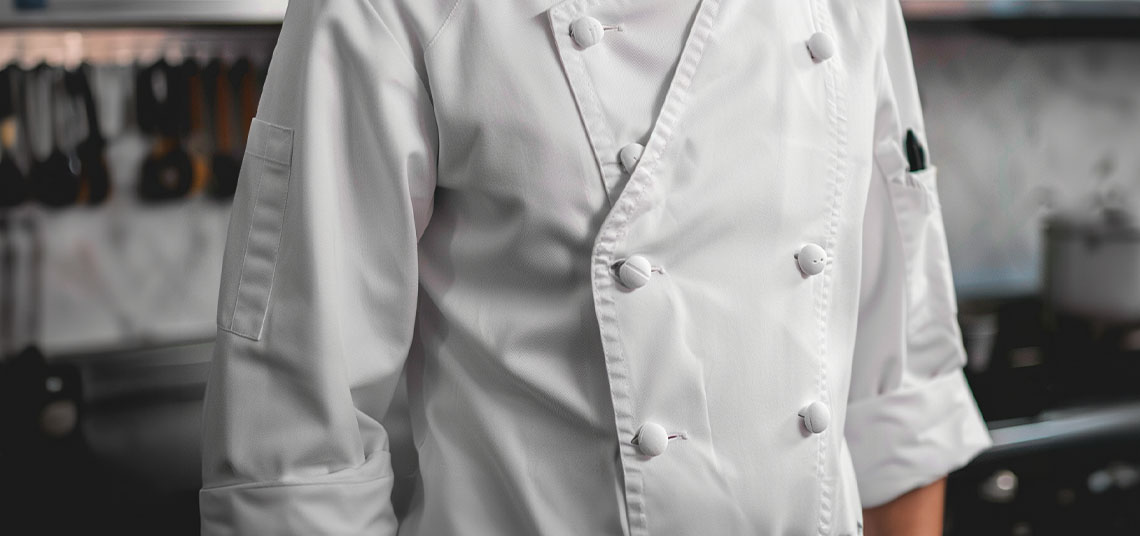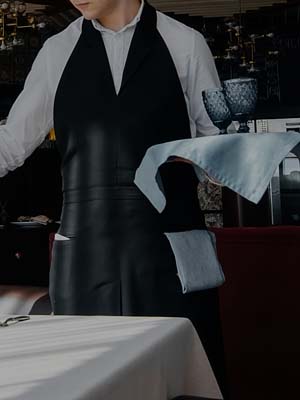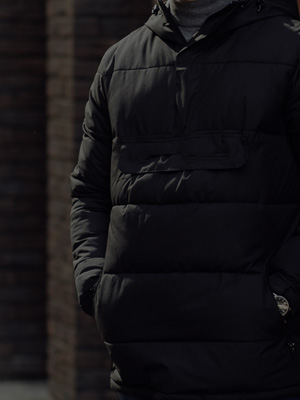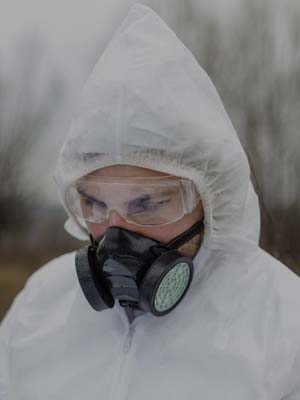Stains Removal: 5 Proven Methods to Restore Your Chef Jackets

Chef jackets are exposed to various stains during long hours in the kitchen. Oil splashes, food dyes, coffee spills, and more can leave permanent marks on these garments. Although the washing process is usually sufficient to remove these stains, some stubborn stains may remain even after washing. In this case, knowing the correct stain removal methods is crucial. In a professional kitchen, maintaining a clean and stain-free appearance is critical not only for hygiene but also for professionalism.
Causes of Post-Wash Stains
There are several common reasons why stains may remain on chef jackets after washing. Understanding these causes is essential for effective stain removal and prevention.

Incorrect Detergent Use
The type and amount of detergent used can significantly impact the cleanliness of chef jackets. Using a detergent that is too mild or not suitable for specific stain types can lead to poor cleaning performance. Additionally, using too little detergent may not effectively break down and remove stubborn stains. Conversely, using too much detergent can leave residue on the fabric, attracting dirt and causing additional stains. Choosing the right detergent and using the appropriate amount is essential to keep chef jackets clean and stain-free.
Inadequate Rinsing
Inadequate rinsing is another common reason for stains remaining on chef jackets after washing. If the rinse cycle does not effectively remove all the detergent and loosened dirt from the fabric, it can result in residue buildup. This residue can cause stains to reappear or create new ones. Ensuring that your washing machine’s rinse cycle is thorough and running an extra rinse cycle if necessary can help eliminate this problem. Proper rinsing is crucial for maintaining the cleanliness and appearance of chef jackets.
Improper Washing Temperature
The temperature of the wash water plays a crucial role in stain removal. Washing at a temperature that is too low may not effectively break down oils and grease, leaving stains on the fabric. On the other hand, washing at a temperature that is too high can set certain types of stains, making them harder to remove. It is important to follow the care instructions on your chef jackets and choose the appropriate washing temperature for different types of stains. Typically, warm water is effective for most stains, but specific guidance may vary based on the fabric and the nature of the stain.
Understanding these common causes of post-wash stains can help you adjust your washing practices to achieve better results.
Stain Removal Methods by Stain Type
Chef jackets often encounter stubborn and challenging stains resulting from kitchen activities. Different stain types require different cleaning methods.

Oil Stains
Oil stains are among the most common stains found on chef jackets. To remove these stains, first sprinkle a small amount of baking soda or cornstarch on the stain and let it sit for a few minutes to absorb the oil. Then, gently brush off the excess powder. Next, apply a few drops of dish soap to the stain and gently rub it in. Let the soap penetrate the stain for a few minutes, then wash the jacket with warm water. Oil stains usually come out completely after a few washes.
Food Dye Stains
Food dye stains, especially from colorful sauces and desserts, can frequently occur on chef jackets. To remove these stains, apply white vinegar or lemon juice directly to the stain. Let it sit for a few minutes, then rinse with cold water. After that, apply an oxygen-based stain remover or a bleach-free laundry detergent to the stain and wash again. Quick action is crucial for food dye stains, so applying these methods while the stain is fresh will yield better results.
Coffee and Tea Stains
Coffee and tea stains are another common stain type on chef jackets. To remove these stains, sprinkle some baking soda on the stain and let it sit for a few minutes. Baking soda helps to lighten the stain. Next, pour a small amount of white vinegar over the stain and gently press to absorb the stain. After this, rinse the jacket with cold water and wash it with regular detergent. Coffee and tea stains are generally effectively removed with this method.
Blood Stains
Blood stains can occur on chef jackets due to minor kitchen injuries. To remove these stains, first rinse the stain with cold water to remove excess blood. Then, apply hydrogen peroxide directly to the stain and let it sit for a few minutes. Hydrogen peroxide helps to oxidize and remove blood stains. Next, rinse the stain with cold water and wash with regular detergent. Avoid using hot water for blood stains, as it can cause the stain to set further into the fabric.
Sauce and Spice Stains
Sauce and spice stains are common when preparing food in the kitchen. To remove these stains, apply dish soap or liquid laundry detergent directly to the stain. Gently rub the detergent into the stain and let it sit for a few minutes. Then, rinse the stain with warm water. If the stain is still visible, repeat the process by applying white vinegar or lemon juice to the stain. Sauce and spice stains are generally effectively removed with this method.
Using the correct cleaning method for each stain type ensures that your chef jackets remain clean and professional.
General Stain Removal Tips
Effectively removing stains from chef jackets requires using the right methods and products.

Stain Remover Products
Stain remover products can be highly effective for cleaning stubborn stains. Various stain removers on the market are specially formulated for different stain types. Here are some stain remover products you can use:
• Liquid Stain Removers: Effective for most stain types, these products are applied directly to the stain. They can be applied by dripping or spraying onto the stain, then letting it sit for a few minutes before rinsing.
• Oxygen-Based Cleaners: Ideal for organic stains such as blood, coffee, tea, and fruit juice. Oxygen-based cleaners oxidize the stain for removal.
• Dish Soap: Highly effective for oil and food stains. Apply a small amount of dish soap to the stain and gently rub it in, then rinse with warm water.
When using these products, it is important to test them on an inconspicuous area of the fabric first to prevent discoloration or damage.
Natural Methods and Home Remedies
Natural methods and easily accessible home remedies provide effective and eco-friendly solutions for stain cleaning. Here are some natural stain remover methods:
• Baking Soda and Water: Baking soda is an excellent cleaner for many stain types. Sprinkle some baking soda on the stain, mix with water to form a paste, and apply it to the stain. Let it sit for a few minutes, then rinse.
• White Vinegar: Particularly effective for coffee and tea stains. Apply white vinegar directly to the stain, let it sit for a few minutes, then rinse with cold water.
• Lemon Juice: Ideal for food dye and oil stains. Apply lemon juice to the stain and let it dry in the sun, then wash as usual.
• Cornstarch: Useful for oil stains. Sprinkle cornstarch on the stain, let it sit for a few minutes, then brush off.
These natural methods offer effective and environmentally friendly solutions for removing stains from chef jackets.
Professional Cleaning Services
Some stains may not be completely removable with home methods, requiring professional cleaning services. Professional cleaning services should be considered especially in the following cases:
• Stubborn and Large Stains: For large and stubborn stains that cannot be cleaned at home, professional services may be more effective.
• Delicate Fabrics: Leather, suede, and other delicate fabrics require professional cleaning to avoid damage from incorrect home cleaning methods.
• Intensive Stain Removal: For a large number of stains resulting from intensive kitchen activities, professional cleaning may be more effective and practical.
Professional cleaning services use expertise and specialized equipment to remove stains, ensuring chef jackets remain as clean and stain-free as on their first day.
These general stain removal tips provide effective methods to keep your chef jackets clean and professional.
Stain Cleaning for Different Fabric Types
Chef jackets can be made from various types of fabrics, each requiring different stain cleaning methods. Using the correct cleaning method extends the life of the fabric and effectively removes stains.

Cotton Chef Jackets
Cotton chef jackets are widely preferred for their durability and breathability. However, cotton fabrics are prone to stains and should be cleaned appropriately. Here are the steps for cleaning stains on cotton chef jackets:
1. Stain Identification and Pre-Cleaning: Choose an appropriate pre-cleaning method based on the type of stain. For example, use dish soap for oil stains or white vinegar for coffee stains.
2. Detergent Use: Apply a small amount of liquid detergent to the stain and gently rub it in. Let the detergent penetrate the stain for a few minutes.
3. Machine Washing: Wash cotton chef jackets at an appropriate temperature (usually 40°C) in the washing machine. Avoid using high temperatures, as this can cause the cotton fabric to shrink.
4. Rinsing: A good rinsing process ensures that all detergent residues are completely removed, preventing new stains from forming.
Following these steps ensures effective stain removal for cotton chef jackets.
Polyester and Blended Fabrics
Polyester and polyester-blend fabrics are known for their durability and easy maintenance. However, there are some points to consider when cleaning stain on these fabrics:
1. Pre-Cleaning: Apply a few drops of dish soap to the stain and gently rub it in. Let the detergent penetrate the stain for a few minutes.
2. Cold Water Rinsing: Rinse the stain with cold water. Using hot water can cause the stain to set further into the fabric.
3. Stain Remover Use: For tough stain, use oxygen-based stain removers. Test the product on a small area first.
4. Machine Washing: Wash polyester fabrics on a low temperature and gentle cycle. High temperatures can cause the fabric to degrade or shrink.
Following these steps ensures effective stain removal and fabric preservation for polyester and blended fabrics.
Special Fabrics and Delicate Materials
Chef jackets can also be made from special and delicate materials such as leather, suede, or silk. These fabrics require careful cleaning:
1. Stain Identification: Identify the type of stain and choose an appropriate cleaning method. Avoid aggressive cleaning methods on delicate fabrics.
2. Professional Cleaning: Opt for professional cleaning services for delicate fabrics like leather and suede. This ensures that the fabric is cleaned without damage.
3. Home Cleaning: For delicate fabrics like silk, use a mild detergent and gently hand wash. Use lukewarm water and avoid rubbing the fabric.
4. Drying: Air dry delicate fabrics away from direct sunlight. Avoid using dryers, as this can damage the fabric.
Following these steps ensures safe and effective stain cleaning for special fabrics and delicate materials.
Stain Prevention Tips
Maintaining a clean and professional appearance for chef jackets involves not only cleaning stain but also preventing them. Proper care and cleaning habits extend the life of chef jackets and minimize stain formation.

Preventive Measures and Care Tips
There are simple yet effective preventive measures to avoid stain formation. These measures help keep chef jackets clean during daily use:
• Use of Aprons: Wearing aprons during food preparation and cooking is a key step in preventing stain on jackets. Aprons protect the front of jackets from direct contact with oils, sauces, and other materials.
• Proper Washing: Regularly washing chef jackets prevents stain from deeply embedding into the fabric. Washing stain immediately after they occur prevents them from becoming permanent.
• Stain Protector Spray: Applying stain protector sprays to the fabric creates a barrier that prevents stain formation. These sprays help keep chef jackets clean and make stain easier to remove.
• Quick Response: Promptly addressing stain when they occur prevents them from setting into the fabric. Applying water or a mild cleaner to the stain immediately helps prevent it from spreading.
Proper Storage of Chef Jackets
Proper storage of chef jackets is important to prevent stain and fabric damage. Here are some proper storage methods:
• Hanging Storage: Hanging chef jackets on hangers prevents wrinkles and creases. It also allows the jackets to air out, preventing bad odors from forming.
• Closed Closet: Storing jackets in a closed closet prevents dust and dirt from settling on them. Closet organizers or covered storage boxes are effective ways to protect jackets.
• Breathable Covers: Storing chef jackets in breathable fabric covers allows the fabric to breathe and prevents moisture buildup. This prevents mold and bad odors.
Regular Care and Cleaning Routine
Establishing a regular care and cleaning routine ensures the longevity of chef jackets. Here are some tips for implementing this routine:
• Weekly Cleaning: Washing chef jackets weekly prevents stain buildup and fabric wear. Use mild detergent and follow proper washing instructions to keep jackets clean.
• Stain Inspection: Check jackets for stain before each wash and treat stain in advance. This prevents stain from becoming permanent.
• Special Care for Delicate Fabrics: Follow special care instructions for chef jackets made from delicate fabrics like leather, suede, or silk. Use special cleaners and methods for these fabrics.
• Periodic Professional Cleaning: Taking advantage of professional cleaning services periodically ensures deep cleaning of jackets. This is especially useful during periods of heavy use.
These stains prevention tips provide effective methods to keep chef jackets clean and professional. Proper care and cleaning habits minimize stain formation and extend the life of jackets.
Maintaining a clean and professional appearance of chef jackets is crucial for both hygiene and professionalism in the work environment. Knowing how to clean different types of stain and how to prevent them extends the life of your chef jackets and keeps them in top condition. For more information and professional cleaning services, you can visit “https://uniforium.com.tr/“. Our expert team is ready to provide you with the best service for the cleaning and care of your chef jackets. For detailed information and to get in touch, you can use the contact form available on our website.

















